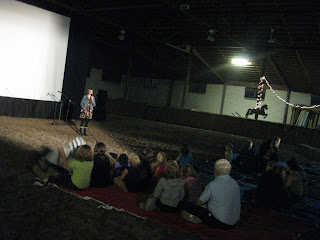When Tiny Circus is on tour, it's one workshop after another. At times it feels as if our magic lanterns (Peanut and Silver Pelican, the airstream trailers) pop out a screen, project a show, and roll out. That's why we're grateful for any small window into the community reaction and lingering thoughts after our departure.
Here's a Letter to the Editor of the Mount Vernon Sun; a beautiful community reflection on Tiny Circus that was a treat to read.
'Tiny Circus' is art in the spirit of cooperation
On the evening of Thursday, Oct. 13, I was mesmerized by a free community showing of stop-motion-animation videos created by the students of Washington Elementary in collaboration with the Grinnell-based "Tiny Circus." This free showing took place on the south-side lawn of the elementary school with hundreds of people from the Mount Vernon community in attendance. It was an open air showing under the stars, the audience in lawn chairs, and on blankets; visiting with neighbors, parents, grandparents and anyone lucky enough to know it was happening that evening.
It was a magical event - a genuine collaboration on the part of children, their art and music teachers, Sarah Fitzgerald and Kristi Keast, and a group of traveling animation artists under the leadership of Carlos Ferguson, a gifted artist, communicator and all-around creative organizer.
This was Tiny Circus's second visit to Washington Elementary. The 2010 animation with Mount Vernon students titled "Elephant Trap" can be seen on YouTube. Photo-documentation of this years animation, "Giraffe Trap" can be seen if you go online and google: mustang moon, tiny circus.
Rich with whimsy, student-composed music, drawing, collage, live performance, and great degrees of patient practice on the part of everyone involved, this event points to a need many of us feel in our daily lives for the sort of cooperative engagement that can transform an idea into something actual.
In our current national climate of divisiveness and disrespect, a program that leads by example, teaching that cooperative effort makes us all winners is one that should be encouraged and continued in our school system. I only hope that continued funding for such worthwhile educational programming makes that possible.
Sue Coleman
Mount Vernon
Here's a Letter to the Editor of the Mount Vernon Sun; a beautiful community reflection on Tiny Circus that was a treat to read.
'Tiny Circus' is art in the spirit of cooperation
On the evening of Thursday, Oct. 13, I was mesmerized by a free community showing of stop-motion-animation videos created by the students of Washington Elementary in collaboration with the Grinnell-based "Tiny Circus." This free showing took place on the south-side lawn of the elementary school with hundreds of people from the Mount Vernon community in attendance. It was an open air showing under the stars, the audience in lawn chairs, and on blankets; visiting with neighbors, parents, grandparents and anyone lucky enough to know it was happening that evening.
It was a magical event - a genuine collaboration on the part of children, their art and music teachers, Sarah Fitzgerald and Kristi Keast, and a group of traveling animation artists under the leadership of Carlos Ferguson, a gifted artist, communicator and all-around creative organizer.
This was Tiny Circus's second visit to Washington Elementary. The 2010 animation with Mount Vernon students titled "Elephant Trap" can be seen on YouTube. Photo-documentation of this years animation, "Giraffe Trap" can be seen if you go online and google: mustang moon, tiny circus.
Rich with whimsy, student-composed music, drawing, collage, live performance, and great degrees of patient practice on the part of everyone involved, this event points to a need many of us feel in our daily lives for the sort of cooperative engagement that can transform an idea into something actual.
In our current national climate of divisiveness and disrespect, a program that leads by example, teaching that cooperative effort makes us all winners is one that should be encouraged and continued in our school system. I only hope that continued funding for such worthwhile educational programming makes that possible.
Sue Coleman
Mount Vernon











































